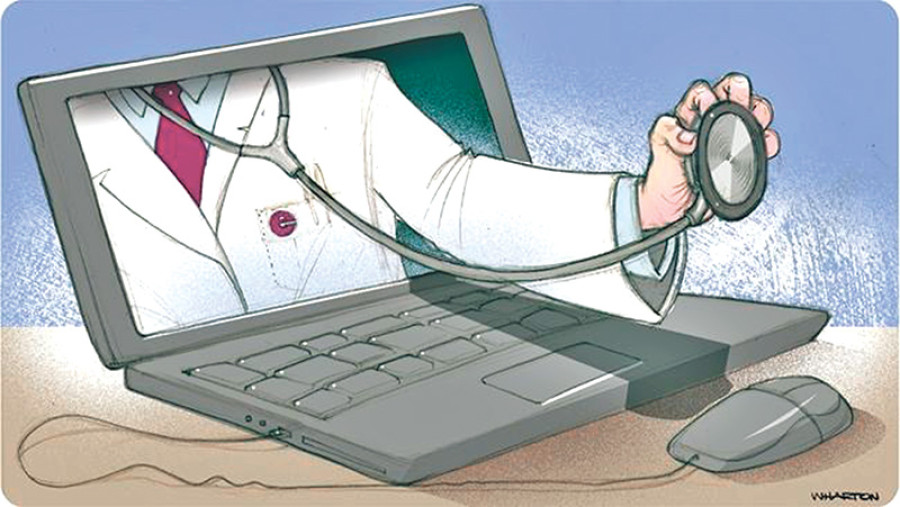Opinion
Modern methods
Information and communication technology has been instrumental in tracking and solving health problems
Ankit Khadgi
Information and communication technology (ICT) plays an immense role in the development of society. The implementation of development plans and policies cannot be effective without using ICT. It is the key driver for the improvement of education. ICT empowers people and makes them more aware than before. Through the medium of ICT like radio, internet, SMS and television, people can find out about diseases and even treat them by identifying the symptoms. For instance, community radio played a significant role in controlling outbreaks of waterborne diseases like cholera and diarrhoea in Nepal, and even promoted healthy habits like washing the hands with soap and water.
ICT also helps health workers and professionals to create a better public healthcare system. They can identify and track trends. For example, if a large number of people from a certain area are looking up information about a particular disease, health workers can narrow down the affected areas. Electronic databases allow health workers to understand and track outbreaks and mobilise immediate medical help. The authorities can also track outbreaks with the help of electronic databases like Google Flu Trends. In Lahore, the Pakistani government used smartphones to track and control a dengue outbreak in 2012. Dengue tracking teams recorded geo-tagged pictures and collected data to find out where the government should focus its preventive measures. The app was so effective in tracking down the cause of the outbreak that dengue cases in Lahore decreased 80-fold compared to the previous year.
Likewise, telemedicine uses ICT to provide health services from a distance. In Nepal, where rural areas do not have proper health services, locals can benefit from telemedicine. Whenever there is a disease outbreak in a rural area, most locals are unaware of the symptoms or how to treat it. In some places, they have to walk for several days to reach a health post. In such areas, telemedicine can play a significant role in improving the health condition of the community. People can contact health workers and ask them questions about their health problem. Such consultations allow locals to improve their lifestyle and even identify diseases which will ultimately improve their health.
Radio can be a significant tool for distance learning and education for both community health professionals and the general public. The Nepal Family Health Programme, which aimed to promote contraceptives, made extensive use of radio to inform the people about their benefits. The programme design two radio programmes: a distance education programme for community health workers and a drama serial for the common people.
The distance education programme helped to improve the knowledge and counselling skills of community health workers. The drama series, which was a blend of entertainment and educational content, was aired once a week for three years. The radio programmes were so effective that about 839 radio listener groups were formed, and about 21,321 women of reproductive age listened to them.
One of the challenges of adapting ICT is lack of local content. ICT can only be effective when it caters to the needs of local audiences and meets their expectations. For instance, if the messages are too complex to be understood by laymen, they won’t be effective. It is very necessary for programme designers to understand the perception and ideologies of locals and incorporate their understanding to make the messages more effective.
The internet and mobile devices have now become a popular source for looking up medical information. As the internet is free to all and is built on the concept of user-generated contents, the authorities have to be alert as false information can be posted on it. People can fall prey to swindlers on the internet. These swindlers have easy access and can manipulate new internet users. The scammers make big promises about treating even chronic diseases through their medicines which may not be medically proven, and the health of people may be adversely affected. Good health is always above wealth, and ICT is a help to achieving good health. The authorities should now focus on empowering locals by providing access to ICT which will ultimately increase their knowledge and promote their health and well-being.
Khadgi studies media at the Kathmandu University School of Arts




 9.6°C Kathmandu
9.6°C Kathmandu










